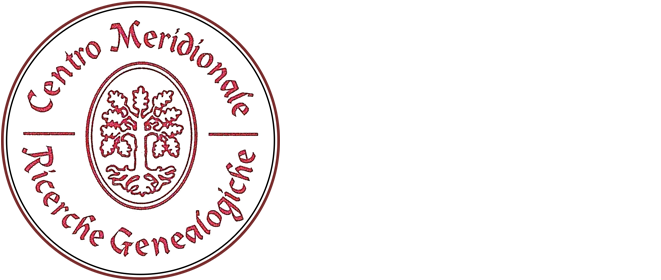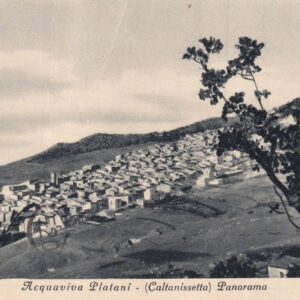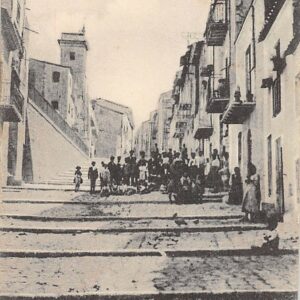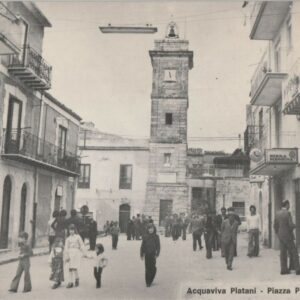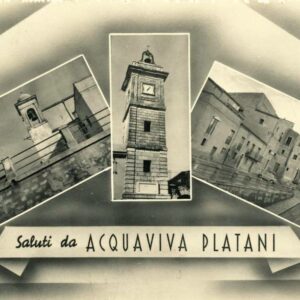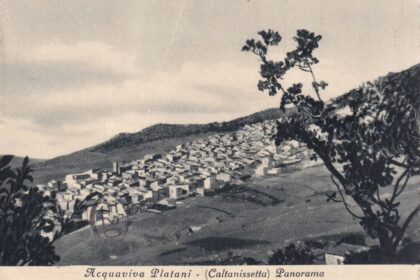
Historical notes on Acquaviva Platani
Acquaviva Platani is a municipality of 876 inhabitants, bordering the municipalities of Cammarata, Casteltermini, Mussomeli and Sutera. Various archaeological excavations have attested the presence of man in the territory since prehistoric times, but only in 1635 the landowner Francesco Spadafora obtain the licentia populandi. The fief and the village, sold in 1680 to Francesca Abarca, subsequently passed to the Oliveri family. In 1686 Michele Oliveri, son of Pietro and Orsola Abarca, obtained the title of Duke of Acquaviva for himself and his descendants. In 1862 the municipality was called Acquaviva Platani (from the name of the river that flows through its territory) to distinguish itself from various other municipalities of the same name. Acquaviva participated in the uprisings of 1820, 1848 and 1860.
Sources for genealogical research in Acquaviva Platani: Civil Status records (births, marriages, deaths)
The oldest civil registrations of birth, marriage and death of Acquaviva Platani date back to the year 1820. In 1819 Ferdinand I, King of the Two Sicilies, instituted the Civil State in Sicily on the model of the Napoleonic one already in force in the other regions of the kingdom, but the recordings began the following year. The civil registrars compiled the following registers in two originals: births, births of abandoned children, marriage banns, marriages, deaths and various documents. The annexes to the birth and marriage certificates were collected in separate files. With the royal decree of November 15, 1865, the new order was introduced which provided for the compilation of citizenship registers.
Consulting the civil status documents is usually the first phase of a genealogical research. If you want to start researching your family history in Acquaviva Platani, contact us for more information!
Sources for genealogy in Acquaviva Platani: parish records (baptisms, marriages, deaths, numbering of souls)
In its XXV session of 3-4 December 1563, the Council of Trent made it compulsory for all parish priests to compile special registers of baptisms, marriages and the dead. Beginning in 1614, a provision contained in the Rituale Romanum of Pope Paul V ordered parish priests to compile real and proper censuses of parishioners: the Status Animarum (States of Souls or Numbering of the Souls).
Certainly parish registers are an invaluable source for genealogical research, but they are not easy to read (they are written in Latin, with spellings and abbreviations that are difficult to understand for non-experts. Therefore, we advise you to rely on professionals for a fruitful research in parish registers. The most ancient parish registers of Acquaviva Platani date back to 1671.
Sources for genealogy in Acquaviva Platani: the “Riveli di beni ed anime”
The Riveli di beni ed anime (Revelations of goods and souls) were censuses compiled by the individual municipal administrations. Numerous registers concern almost all the Sicilian municipalities and cover the period between the 16th and 18th centuries: the documents drawn up in the years 1548, 1569, 1584, 1593, 1607, 1616, 1623, 1636, 1651, 1682, 1714 and 1748 are preserved. They allow us to know not only the composition of individual families but also their socio-economic status and are therefore an irreplaceable source of research.
Sources for genealogy in Acquaviva Platani: notarial deeds
The notarial documentation kept in the State Archives and Notarial Archives is very useful for reconstructing a genealogy. Sometimes these are much older documents than ecclesiastical ones and therefore allow family history to be reconstructed even further back in time. In fact, some deeds, for example wills or dowry contracts, are rich in information of genealogical interest. Furthermore, even the consultation of notarial deeds allows us to know the socio-economic status of the family.
The most ancient notarial deeds of Acquaviva Platani date back to 1757.
WHY RELY ON A PROFESSIONAL GENEALOGIST?
Reconstructing one’s family history is a fascinating adventure, a journey through time to discover places, facts and ancestors. From what you have read so far, you will have understood that it is very difficult to obtain valid results without the help and method of a professional genealogist who knows how to identify the sources necessary for research and correctly interpret ancient documents.
If your family also comes from Acquaviva Platani and you want to entrust us with your genealogical research, contact us! Consultation and preliminary research are free!
Finally, a gallery of old postcards from Acquaviva Platani:
:

 Italiano
Italiano 